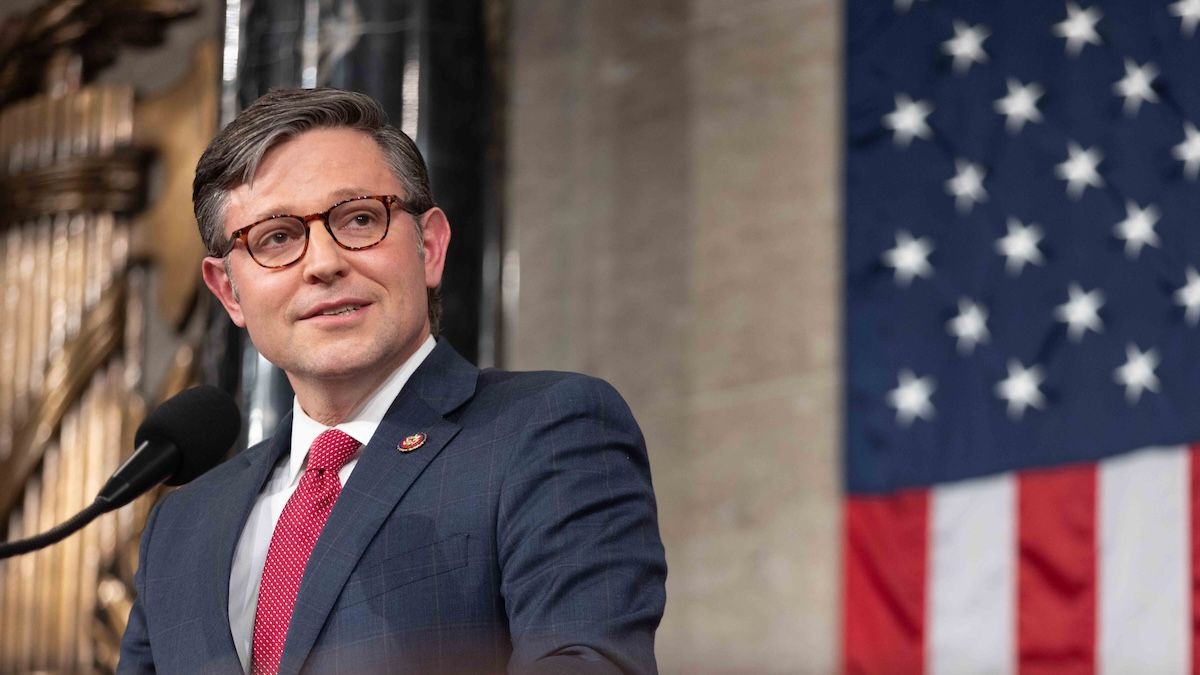Why the House Must Pass KOSPA
Ian Russell, Christine McComas / Aug 2, 2024
Speaker Mike Johnson delivers remarks to the United States House of Representatives, October 25, 2023.
This week, after months of stalemate, the US Senate voted to pass the Kids Online Safety and Privacy Act (KOSPA), a landmark bill that would finally force tech giants to prioritize the health and safety of young people online above their bottom lines. It’s a massive victory for online safety and tech accountability — and sends a powerful message to the companies responsible for Big Tech’s predatory practices. But final passage is far from certain. The House recently canceled a bipartisan hearing on the Kids Online Safety Act and could continue to stand in the way of this critical legislation. We cannot let that happen.
We are both parents. We live on opposite sides of the Atlantic — one of us in the UK and the other in the US — and have never even met in person. But we are members of a tragic club: both of us lost our daughters to suicide as a result of Big Tech algorithms and manipulative design features that drove them further and further into darkness. No parent should be forced to bury their child.
We miss our daughters, Molly and Grace, every single day. And we know that this legislation would save other kids’ lives.
That’s why, on the eve of this historic victory, we are urging House leaders to continue the fight and pass KOSPA.
First, KOSPA does what other efforts can’t — address Big Tech’s predatory design practices head-on. A growing body of research has established a link between social media use and suicide and depression in young people. Several experts have linked excessive social media use in kids and teens to lowered capacity for human communication and social skills as well as increased feelings of loneliness and social isolation. Doctors have also shown that adolescents who use social media are more likely to engage in suicidal ideation. Those grim statistics aren’t an accident; they’re by design.
Big Tech platforms like Meta and TikTok use carefully curated algorithms to surveil and exploit young people’s deepest insecurities and worst instincts for profit. Instead of designing their products with young people’s safety in mind, these platforms are hiring the best engineers in the world to addict and exploit young people’s time, attention, and data.
Thankfully, more people than ever are waking up to the role Big Tech has played in the teen mental health crisis. Today, organizations like Fairplay are getting behind efforts led by school districts and concerned parents to mitigate the negative effects of smartphones on young people’s mental health and neurological development. But even as those more localized efforts grow in popularity, they are no substitute for federal protections for kids online.
KOSPA is different. It’s backed by research that links certain social media design choices to devastating mental and physical harm to young people and contains major reforms that would make a measurable impact on online safety. For example, it would require platforms to use the strongest privacy settings by default for young people and allow them to opt out of or limit addictive features like surveillance-based algorithms that recommend content. The bill would also introduce a “duty of care” that requires companies to “exercise reasonable care” in the design of their products to prevent and mitigate the most harmful effects on young people — such as promoting eating disorders, substance abuse, and self-harm — instead of recklessly spoonfeeding dangerous content to users.
Until we take on Big Tech and its predatory design features, young people will be forced to navigate a minefield filled with daisies. They’ll continue to turn to social media and other online platforms in search of connection, only to fall victim to Big Tech’s endlessly harmful and addictive algorithms.
And we know that every day counts. By a modest estimate, we can expect that 36,000 young people in the US will attempt suicide in the 30 days that congressional leaders are home to for August Recess. That’s why it’s crucial that we get a bill passed as soon as possible – not only through the Senate but through the House and to President Biden’s desk before his term ends in January 2025.
Finally, KOSPA will demonstrate US leadership around the world. If enacted, the bill would help pave the way for similar efforts in other countries — like the UK’s newly passed Online Safety Act — and help protect kids across the globe. And while there is still work to be done to strengthen its protections, KOSPA would serve as concrete proof that we can take on Big Tech – and that we can win.
As congressional leaders enjoy time with their families next month, millions of kids and teens in the US will be fighting silent battles against predatory algorithms designed to keep them scrolling at tremendous cost to their mental and physical health. They don’t get a summer break from Big Tech’s relentless business model that lines corporate pockets by exploiting and surveilling developing minds. We have no way of knowing how many kids will lose their battles against despair before returning to school this fall, but one thing is certain: we can’t rest until KOSPA is law.
Related: Read more perspectives on KOSA
Authors

